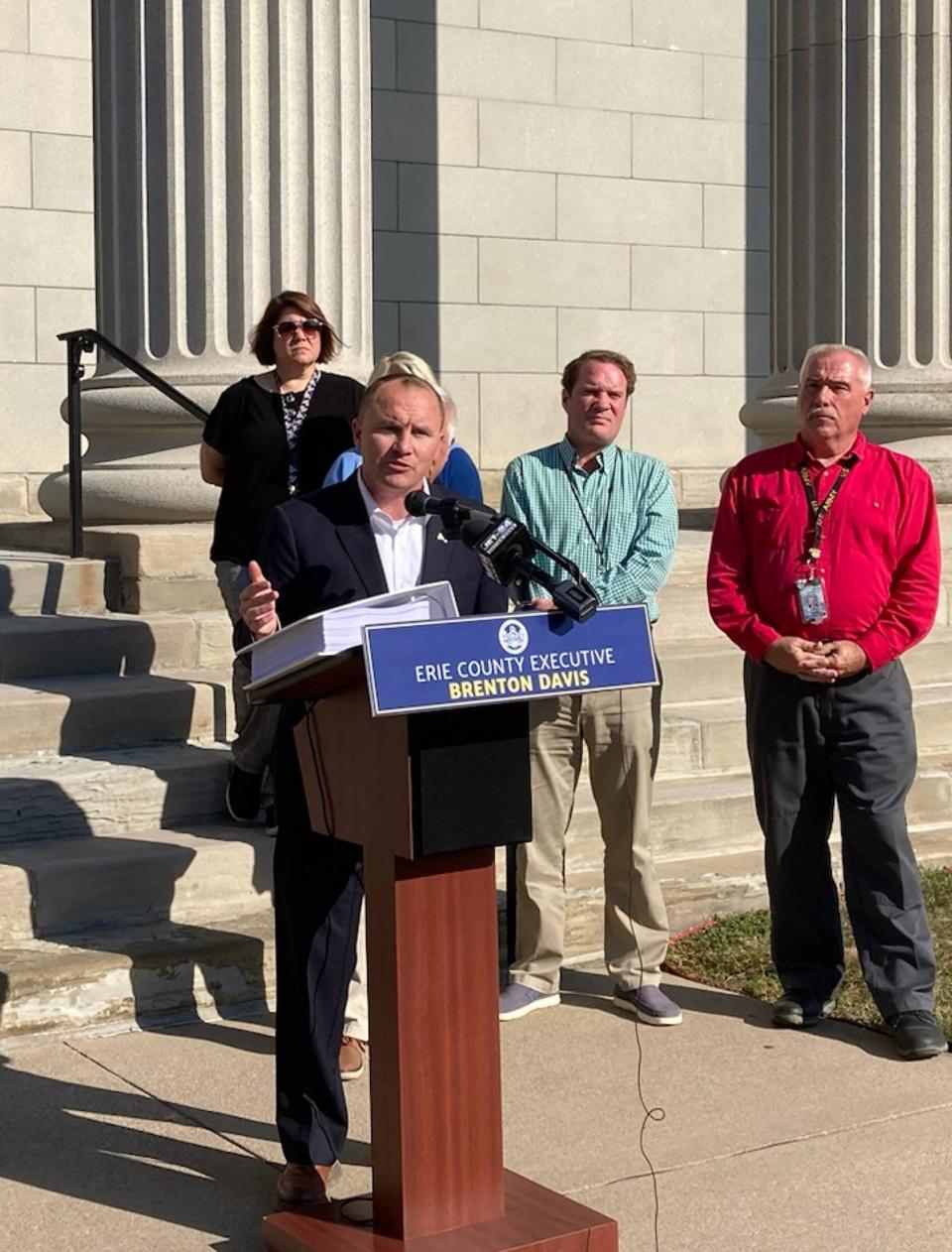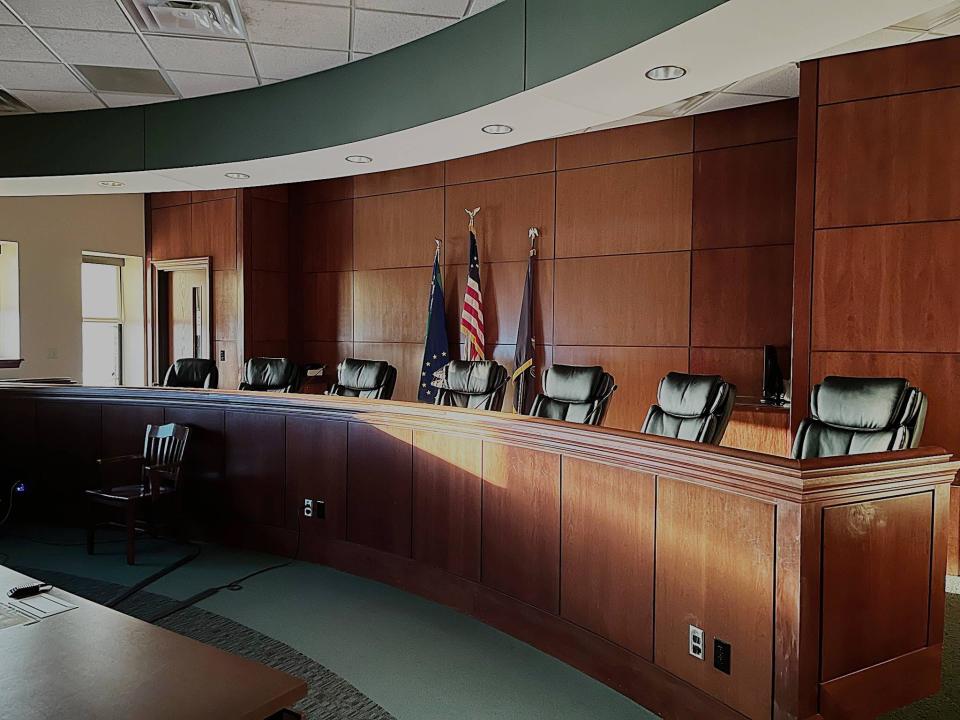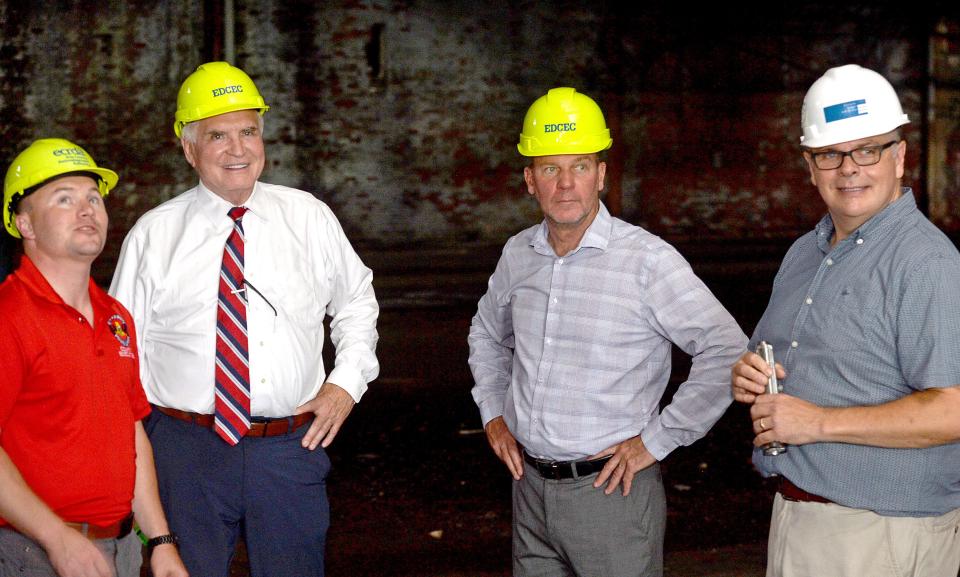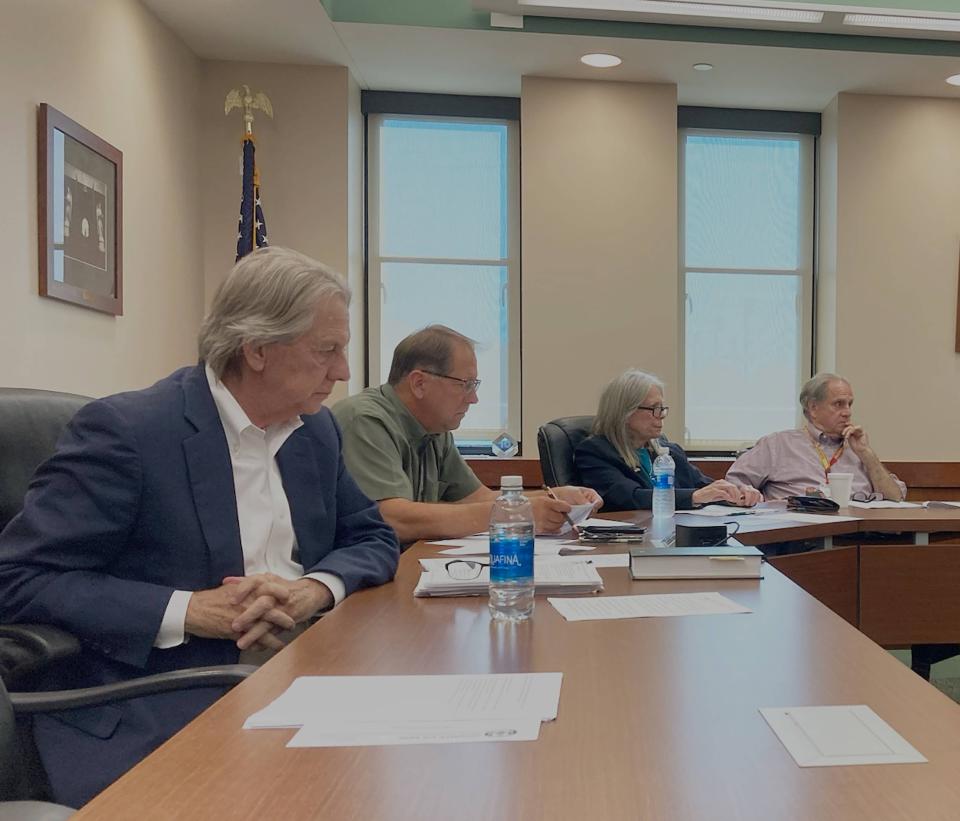Erie County executive's proposed 'modest' tax hike would be county's highest since 1983
Erie County Executive Brenton Davis describes his proposed property tax increase for 2024 as "modest." If it goes through, it could also be described as "historic."
Davis wants taxes to go up by 0.85 mills. The boost would mean $85 more in taxes for the owner of a property assessed at $100,000.
The hike — if Erie County Council approves it — would increase county property taxes by 14.3%.
An increase of 14.3% would represent the fourth-highest percentage tax increase in county property taxes since 1978, when the county implemented the current county executive-council form of government under the newly adopted Home Rule Charter.
An increase of 14.3% would also represent the largest percentage increase in county property taxes since 1983, when county taxes went up 15.6%, according to an Erie Times-News' analysis of county millage rates. The county last raised taxes in 2021, when the rate increased by 4.4%, leading to a hike of $25 for the owner of a property assessed at $100,000.
Davis asked for the tax increase when he presented his proposed 2024 budget in early October. Davis said the county needs the tax increase to raise $12.1 million in revenue to fund higher expenses than in 2023. County Council is now holding a series of budget talks as it prepares to vote on a final spending package by the Nov. 30 deadline.
Davis, a Republican who was elected in 2021, campaigned on a promise that he would not raise taxes as county executive in his first term. As a candidate, he used the acronym N.I.C.E. to outline his position, saying the abbreviation stands for "No new taxes or fees; Innovation and infrastructure; Collaboration; and Education."

In a debate in September 2021, Davis expounded on his pledge, for his first term.
"We do not have a revenue problem," he said at the time. "You look at the influx of money that's coming in from the federal government, the American Rescue Plan money. We have a moonshot moment here. We don't need a tax increase."
What does Davis think of those remarks now that he has proposed a tax increase, and a historically significant one at that?
"I wouldn't say it's a regret," he told the Erie Times-News in an extensive interview about his budget proposal. "I've said this before, in terms of leadership: There's a difference between being a candidate when you think you know, then just learning lessons.
"You're going to make amateur mistakes. Candidates say things all the time. And I can tell you the view as a candidate and the view as the elected county executive, having access to this (budget) information, I've learned valuable lessons.
"I have no excuses for statements I made in the past. I think they're more idealistic than anything. You just can't foretell the future. And I've talked to some of my mentors who have been doing this a long time and they're like, 'Well this is why you can never say never.'"
Davis' proposed tax increase, by the numbers
Like other taxing agencies, the county uses a millage rate to establish a tax rate. Each mill represents the amount of tax payable per dollar of a property's assessed value.
One mill equals $1 in property tax levied per $1,000 of a property's assessed value. The relationship is reflected in the origin of the word "mill." It is derived from the Latin word "millesimum," which means "thousandth."
The current millage rate for Erie County government is 5.96. When applied to a property assessed at $100,000, that millage rate leads to an annual tax bill of $596, or $100,000 multiplied by 0.00596.
Davis wants to increase the millage rate by 0.85 mills, which would set the new rate at 6.81. When applied to a property assessed at $100,000, that millage rate would lead to an annual tax bill of $681 — an increase of $85 over the current county tax rate.
Raising the millage rate from 5.96 to 6.81 mills would represent an increase of 14.3% in the millage rate. The increase of 0.85 would bring in about $12 million in additional revenue, according to the county.
The monetary amount of the percentage increase would vary based on the property's assessed value. For a property assessed at $200,000, the hike would increase the annual county tax bill from $1,192 to $1,362 — a boost of $170. For a property assessed at $50,000, the hike would increase the annual county tax bill from $298 to $340.50 — a boost of $42.50.

In 1983, the last time the county raised taxes by more than 14.3%, the millage rate was 27.75, though that rate was based on an assessment of 40% of market value rather than the current 100%. In 2002, the county went to a 100% valuation as part of the first countywide reassessment since 1969.
The millage rates dropped following reassessment, but going from a per-parcel valuation of 40% to 100% counterbalanced the millage reductions. Relying on the 100% valuations was meant to ensure assessments reflect the current market value.
In 1982, the millage rate for the county was 24. Increasing the rate to 27.75 in 1983 represented a jump of 15.6%.
That percentage increase is not the highest in county history, according to the Erie Times-News' analysis of millage data, which the Davis administration did not dispute.
Based on millage rates, the highest percentage tax increases in county taxes since 1978 were the following:
17.1% in 1981
17.1% in 1982
16.6% in 1980
15.6% in 1983
Early 1980s redux? Erie County's challenges like those of past
The county's tax rate is generally low compared with the tax rates of individual municipalities because the countywide tax base is so large. The base is made up of all 116,567 taxable properties in the county rather than just those in a single municipality, such as the city of Erie. The total taxable value of all the taxable parcels in the county is $14.6 billion, according to the Erie County Assessment Bureau.
In the city of Erie, for example, the owner of a house assessed at $100,000 pays $1,312 in city taxes — $716 more than the current county tax rate of $596 for a property assessed at $100,000. If the taxes in the city went up 14.3%, the tax bill on a property assessed at $100,000 would increase by about $187, or more than double the $85 that would come with a 14.3% increase in county property taxes.
Though county tax increases are typically smaller than the tax increases for other municipalities, the county's elected officials — as is the case with most politicians — have usually been reluctant to raise taxes or to raise taxes by large amounts.
In Erie County, the percentage tax increases have been in the single digits, save for the early 1980s, when the county's finances were in turmoil. As the United States struggled through a recession during that period, the county had problems transitioning from one county executive to the next.
Heated debates about the budget broke out as the administration of the county's first county executive, Russell Robison, a Republican who held the office from 1978 to 1981, stepped aside for the administration of its second, Judy Lynch, a Democrat who served as county executive from 1982 to 2002.
Shortly after she took office in January 1982, Lynch blamed the Robison administration for inflating revenues in the 1982 budget, which she said created a hole for her administration as it fashioned budgets for 1983 and beyond.
In February 1982, Lynch said the county was already looking at a deficit of more than $2 million that year because of the revenue problems and larger-than-anticipated bills. She cited a $700,000 bill the county owed for Ere County inmates who had stayed at what was then Fairview State Hospital, which treated the criminally insane until it closed in 1995.
As she looked ahead to the budget for 1983, Lynch said she was concerned about a $1 million increase in expenses due to inflation and another $1 million increase in expenses due to costs at the Erie County Geriatric Center, now called Pleasant Ridge Manor.
Lynch said she would rely on long-term planning to help ease the county's budget woes.
The year "1983 is going to be the test," Lynch told the Erie Daily Times in a story published on Feb. 25, 1982. She said the year "1982 is going to be nothing compared to 1983."
To use the fund balance or not? Davis weighs in
Davis also blamed unforeseen expenses for the county's current budget difficulties. The economic challenges he cited were not unlike those that Lynch said were buffeting the county's finances in the early 1980s.
"The highest inflation in 50 years and the pandemic contributed to higher costs across all areas of government from materials to labor negotiations," Davis said in the letter in which he submitted his proposed 2024 budget to County Council on Oct. 1. He described his proposed tax increase as "modest" in the letter.
Davis said several factors in particular contributed to costs increasing by $12.1 million in 2024. He said expenses related to mandated services represented a major reason for the increase, and he said:
The county's required pension contribution went up 42%.
Pleasant Ridge Manor required a budgetary transfer of $999,996.
Cost of mandated health care at the Erie County Prison rose by $1 million.
Health insurance costs for the county increased by 5%.
Davis elaborated on the county's fiscal challenges in the interview with the Times-News. He said wage increases among county workers represented another significant cost. The added expenses of the wage increases are $3 million in 2023 alone, Davis said.
"You're talking the historic wage increases," he said. "You look back, we've never been anywhere close to the increases that they just saw."
Davis' director of finance, Paul Lichtenwalter, said another problem, from the perspective of the Davis' administration, is that previous administrations and councils raised taxes little or not at all in previous years, leaving the current administration to scramble to deal with high inflation and other factors.
"They were overspending," Lichtenwalter said. "I'm not throwing stones. This is a simple fact of the math of the numbers."
Davis' proposed general fund budget, or the budget most reliant on tax revenue, is $134 million. His overall proposed budget for the county, which includes services funded primarily with state and federal dollars, is $583 million.
Tax increases vs. a 'pro-growth' county
Davis also criticized previous administrations and councils for what he said was too heavy a reliance on dipping into the county's budgetary reserve to balance the budget. The unrestricted reserve account now stands at about $54 million, according to county figures, and Davis said he is proposing using about $1.7 million of that to help offset a larger tax increase. Without that $1.7 million, he said, taxes would go up another $15 for the owner of a property assessed at $100,000 — a $100 increase overall, including the $85 boost.
Davis said he decided to "split" how he handled a need for increased revenue by proposing the millage increase while also proposing to use $1.7 million in reserve.
"There's a couple things that we need to look at," Davis said. "If you dip into your reserve balance, that can affect your bond rating. Two, we need to look at our reserve balance for capital expenditures that we have here in the county. Strategic investments. That's where we should be using our reserve balance. But we thought it was prudent to split the difference."
Given the circumstances, Davis said he stands by his description of the proposed tax increase as "modest." He said his analysis shows that Erie County is in "the middle of the road" for tax increases compared with other counties state- and nationwide, and he said the proposed increase is modest because it is less than an increase of 1 mill. He said his proposed tax increase takes a restrained approach to addressing inflation-driven costs amid a stagnant tax base in the county.
"I don't want to raise it. I don't want to raise taxes," Davis said. "I'm not a proponent for taxes."
"To me, this is sounding the warning," he said. He said "0.85 is modest, but if we continue down this path and this stuff keeps compounding without growth, it's not going be modest."
"I'm telling you where this is headed," Davis also said. "It's modest this year in comparison for sure. I'd rather it be net zero. But in order to do that, we've got to have growth."

He reiterated that his proposed increase is meant to be a "warning."
"There's a lot of obstructionism in terms of anti-development, anti-investment," Davis said. "Erie County needs to wake up (about) what it means to be a pro-growth, pro-business economy."
Davis cited examples of local economic development, such as the Japanese company Kyocera's purchase of the Erie-based Bliley Technologies, a deal announced in October. He pointed to other economic development projects he has also backed.
They include Project Resolve, the long-term strategy championed by Penn State Behrend to spark advanced manufacturing in Erie County, and Gannon's University's $24 million water quality initiative known as Project NePTWNE, pronounced "Neptune," after the Roman god of freshwater and the seas. NePTWNE stands for Nano & Polymer Technology for Water and Neural Networks.
"These are the initiatives that we truly need to invest in, and retaining our local and growing our local businesses," Davis said. "If we don't grow this portion of this pie, taxes are the only alternative.
"Because the unfunded mandates, they've never turned around and went backwards and said, 'Oh, don't worry about that.' It's always more. That's what I've learned in two years: It's never less.
"We've got to grow. If you don't grow, it's taxes. That's really the message that I want to send with this budget. This should stabilize us for at least the next four to five years," Davis said.
"So, in that four to five years, whatever this tax increase comes out as, if we do it right, we have a four- to five-year window that we have got to take this seriously, in terms of turning our economy around, of being pro-growth, landing businesses, seeing things like Project Resolve, Project Neptune and developing our regional industrial clusters. That is how we can get ourselves away from this regressive economy of taxation constantly."
Will Davis' proposed increase happen in the end?
While Davis is unapologetic in proposing a 14.3% tax increase, he is just as certain that a hike of that magnitude will not survive County Council. Members of council held their most recent budget session on Tuesday at the county courthouse and have another scheduled for Saturday.
"I don't believe the tax increase that I sent down is going to be what gets passed," Davis said. "We still have work to do with council."
A key councilman agreed.
Jim Winarski, a Democrat, represents sections of Erie and Millcreek Township as well as Wesleyville. He is also considered a swing vote on council, which has a 4-3 Democratic majority but which has also backed Davis on certain projects.
Winarksi said he expects council to make cuts and other adjustments to reduce the proposed tax increase when council passes a final 2024 budget.
"If not eliminate it, at least cut it in half," Winarski said of Davis' proposed tax increase.
He said council is exploring using some of the unrestricted reserve account to ease the need for a tax hike, though he said he appreciates the administration's concerns about relying on the reserve account too much and damaging the county's bond rating.

"That is what it is there for," Winarski said of the reserve account, which he said is made up of taxpayers' money built up over time.
"It's their money. Let's use it if we need to," he said.
Winarski cautioned that a tax increase might be inevitable nonetheless as the county wrestles with inflation and other factors.
"With the cost of doing business itself, we may have to go there," Winarski said of a tax increase. "We just don't want to go as high as the administration has proposed."
No matter what council does, Davis said he has no second thoughts about his proposed tax increase ― an increase he once said he would never support in his first four years in office.
"You never set your feet in concrete. For me, that's a lesson learned," Davis said. "I would say just for anybody that's running for office that wants to stand out there on the sidewalk and criticize internally anywhere, in a school district or whatever it is, I can tell you the view looks a lot different from in here.
"Do I regret it? I don't have regrets. I have lessons learned and now I have experience that I didn't have before. I'm not going to make any excuses for anything that I've said or done. What I'm going to do is learn from that experience and move forward to be the best possible leader for Erie County that I can be."
Contact Ed Palattella at epalattella@timesnews.com. Follow him on X @ETNpalattella.
This article originally appeared on Erie Times-News: Davis' proposed Erie County tax increase would lead to hike of 14.3%

